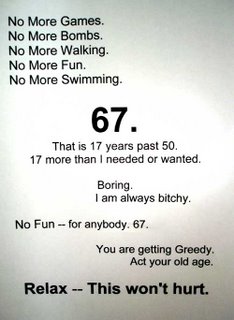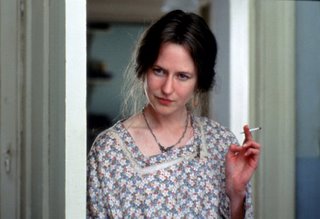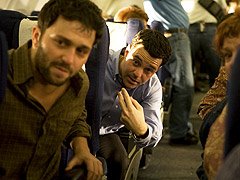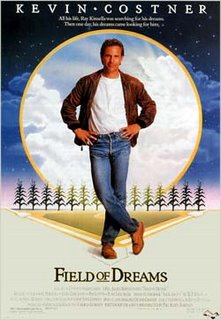I like to walk around my neighborhood at night as much as possible, because it is rather... interesting. By this I of course mean there are lots of homeless and crazy drunks, sometimes combined into one person. So, it may be a lot of things, but it is rarely boring. And last night was no exception.
I was returning home from a trek up to the Circle K when a group of three, two men and one women, darted across the street and onto the road a few feet in front of me. They were loud, and not really feeling like talking, I kind of hoped they would ignore me. Two of them did, but one had apparently spotted me and determined that I was the sort of chap he could hit up for random, awkard conversation.
"Hey man, where are you off to?" he asked. Instantly I hoped whatever answer I gave him would not be taken as an invitiation to join me for the evening.
"I live down here," I replied.
"Hey man, you smoke that weed?" Apparently, it was immaterial what I was up to, unless the Rice Krispie bar in my bag was actually disguised pot.
"Yeah man I do, but I ain't got any," I said, hoping that this might get rid of him. Unfortunately...
"Ah, man, I hear that. I took a bunch of pills tonight."
"Great." By this point we were stopped in front of the Jack-in-the-Box, and I had a real chance to size him up. About my height, little shorter. Shaved head, cut, and with a ton of ink. All black and white. Kind of sunken eyes. He had a glass in his hand, filled with something. I assumed booze, but it could have been tea. Couldn't really smell anything. We started walking again, mostly so he could catch up with his friends who were a good block or so ahead. When he turned around, I saw that the back of his neck was done. It was a skull, missing a bottom jaw, but with human eyes, and something was coming out of his mouth, but the shirt covered the rest up. The work was good, but it also looked really familiar.
"How long ago these apartments go up?" He asked, gesturing wildly towards the buildings.
"Couple of months ago, bout the time school..."
"Looks like a goddamn high-rise prison with all of the gates."
Thinking about what he had just said, I didn't really have time to absorb it. Because the next thing I knew...
"Hey man, can you hold this?" Giving me little choice not to, I took his glass. And as soon as I had it, the dude was taking off his shirt. And that's when I saw it, and all of a sudden I knew why the skull looked so familiar and why he had made the comment about the apartments.
It was a swastika. And a poorly one done at that. In fact, the art was so shabby it was without a doubt done while homeboy was serving time. He was probably a Brother if he had been to prison, which meant the fellow not only enjoyed getting fucked up, but fucking other people's shit up as well.
I tried not to stare, lest I be accused of being a "fag-it" and getting curbed on my way back from picking up some muchies at ye olde local convience store. But I figured out he was really too messed up to notice. His entire back was covered, and the swastika was the only one which looked like it had been put on him in the joint. I recognized them as all being pretty common for skinheads to wear, since I had seen a lot of the same symbols when I had looked through portfolios before I got my pieces done.
It was at this point several thoughts began running through my head. I don't exactly live in an all-white neighborhood. So, not only did I start thinking about my own safety, but his as well. He may have been an ignorant fuck, but I really preferred not to be a first-hand witness to a goddamn race riot. This didn't seem to cross his mind, at least that's how he acted. But I also noticed that he started walking in more of march, so maybe he knew exactly what he was doing.
I also wondered if he was "true believer" or just ran with the Aryans to survive prison. But just as I started thinking about it, I was really beginning to hope that are paths would be splitting up soon, too.
"Goddamn morons parked all the way down at the Burger King," he turned and said to me.
"Why'd they do that?"
"Beats the fuck outta me, man. Fuckin' mile out of the way. And at goddamn, nigger Burger King." Well, so much for that question. I really wanted to laugh, but I remembered one thing: he could probably kill me with his bare hands, not to mention the glass he held.
So I mustered up an, "Oh yeah?"
"Yep, nigger Burger King." About this time, his friends started to cross over to the B.K., and he followed suit.
"Stay safe, man," he used as a good-bye.
"You too, man, " I answered back.
I really don't know what to make of it. but truth be told, he was the most interesting person I had met in a while. And part of the reason I don't just drive my car into one of the lakes around here. I kind of live for these random moments. there are so many stories out there, some sad, some happy, or in this case, some angry. but whatever it is, they all intrigue me.
ever since I was kid, I've met people this way. for whatever reason, they just come up and start talking. often they are much like the population of my neighborhood, drunk and/or crazy. When I was ten, one homeless guy thought I was his doctor and wanted to know why I hadn't seem him in a while. A month ago, one of the local bums came up and started talking Marx with me. I was in heaven. For being a complete wino, he knew his shit. Had he not been scared off by a cop, I think we would have talked for a while. About two weeks after that, he stopped me in the above-mentioned Circle K parking lot and asked if I wanted to split a case of beer with him. Unfortunately, I had to go back into work, or else I'm pretty sure I would have. In law school, one of my best friends was the janitor. He stayed at my place a couple of weekends. We sat around, drank beer, got stoned, talked classic rock, and passed out to horror movies. And he only talked to me about his life.
i don't know why I listen, or even why they feel as if I'm someone they can talk to. I would to think they see something in me, instead of them just being batshit crazy. I don't really know. but i think i'm better for it. and maybe that's all that really matters. it's enough to keep me walking.


 You want to know why The Hours is on here? Because every man I know hates it, and every woman loves it. And it leads to guys writing the movie off as "gay," "boring," and "typical feminist bullshit." Too bad they don't actually pay attention to what the movie is saying about gender roles in our society and then try to be better boyfriends/husbands.
You want to know why The Hours is on here? Because every man I know hates it, and every woman loves it. And it leads to guys writing the movie off as "gay," "boring," and "typical feminist bullshit." Too bad they don't actually pay attention to what the movie is saying about gender roles in our society and then try to be better boyfriends/husbands.
